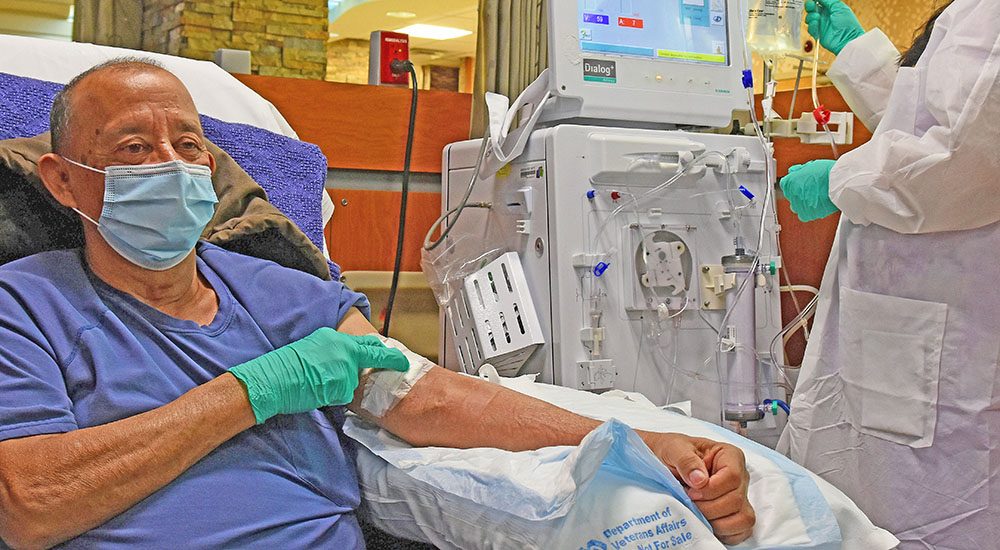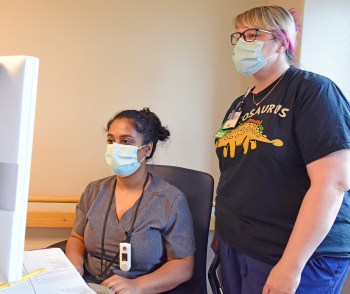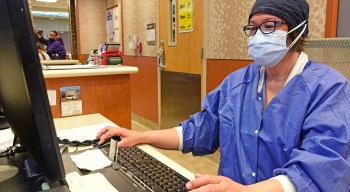The city of Dallas lay still, shrouded in a deep, icy embrace. Trees bent, weighed down by the heavy coating of ice, electricity flickered on and off throughout the morning, and traffic halted to a standstill. The city was paralyzed by the sheer power of the freezing temperatures and the relentless ice and freezing rain.
Dallas VA mobilization
Inside Dallas VA, a different story was unfolding. The staff of the hospital mobilized quickly and efficiently as soon as the storm began. They had all come together—nurses, doctors, environmental services, food and nutrition staff, volunteers, and a host of others—to construct a fortress of care. Nowhere was that more apparent than the medical center’s Dialysis Clinic.
“Our Veterans do not have an option. They have to be here for their treatments,” said Maria Barrientos, dialysis clinic nurse. “We have to be here. This clinic cannot shut down, so we plan, take our time and make sure we are here for our patients.”
Without dialysis, a variety of complications
Dialysis patients typically receive treatments three times a week, each session lasting several hours. Without dialysis, excess fluid and waste products accumulate in the body. This can lead to a variety of complications including heart and lung failure, coma and even death.
Barrientos is the vanpool driver for the clinic. She is from New York and says she’s accustomed to driving in snow. But this time, driving on ice to get her team of nurses and techs to work, was the first time she’d ever been scared while driving.
Making more than a half dozen stops along the way, Barrientos filled her van with staff and made the long slippery trip, making sure there was ample staff to care for Veterans like Richard Shea, a Viet Nam Marine Corps Veteran who has been on dialysis since 2014. Driving at times no more than a couple miles an hour, Shea says the trick is to simply keep away from everyone else on the road.
The hospital staff, who had only a few hours of warning before the storm hit, worked to find resting places in offices, conference rooms, lounges and other small areas. Their mission was clear: Stay in the hospital, no matter what it took, to ensure the Veterans under their care could still receive the care and attention they needed.
It quickly became clear that it was going to take more than just dedication. The staff had to get creative. Beds and cots were set up in offices. Clothing and blankets, personal hygiene kits and even meals-ready-to-eat (MREs) were handed out by canteen services.
Courage and a lot of effort made all the difference
Center for Development and Civic Engagement volunteers and staff and Chaplains rallied to care for those who care for our Veterans. Staff began to plan for a long stay.
The hospital staff worked together to create a safe, comfortable space for everyone. They cooked meals for each other and tried to make the best of the situation, sharing stories, music and more.
“Every unit was short staffed, so we helped wherever we could,” said social worker Heather Staples. “Sometimes that meant talking with family members and Veterans to help relieve any anxiety they were feeling. Other times, that meant helping our nurses where we could.”
The storm may have brought the city to its knees but the staff of the hospital refused to be defeated. They endured and thrived in the icy embrace, ensuring that Veterans in their care were never forgotten. For the staff of VA North Texas, the storm was a story of how a little bit of courage and a lot of effort can make all the difference.
Topics in this story
More Stories
Face it, muscle tension is not good for your health, but you can do something about it in 15 minutes!
For a group of Veterans at the Central Virginia VA Health Care System, Parkinson’s care includes a regular check-in to see what they’ve built with Legos.
Daughter and son-in-law find a diary of her father's life as a prisoner of war written on toilet paper.








I Loved working as an R.N.
~~You “never” get rained out~~